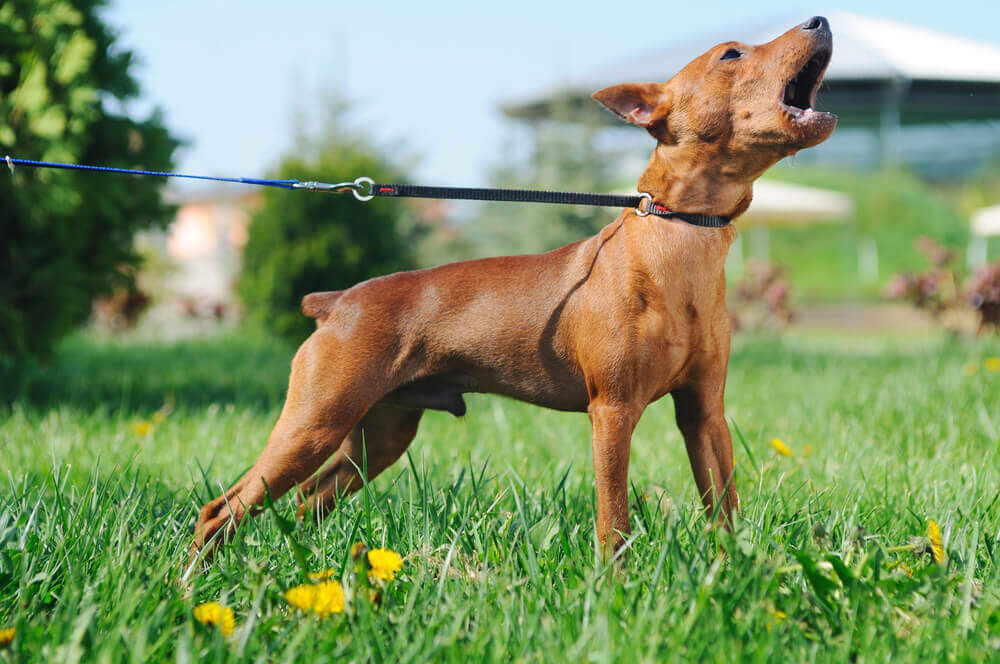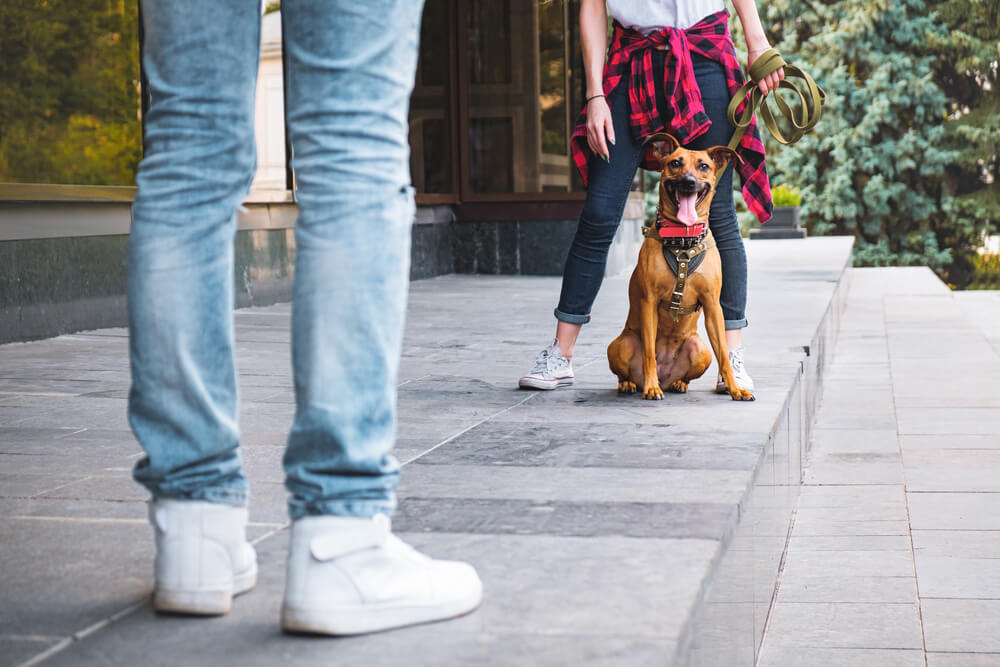Barking is a dog’s right. But sometimes, it goes too far. And when the neighbors can tell or the kids in the park start to run away – it makes you wonder whether it is something socially acceptable or something that needs to be corrected.
The problem is not always your dog. You would be surprised to find that root of the majority of incessant stranger-barking has more to do with the environment around.
On average, dogs bark between four to five times over an 8-hour time span and each bark lasts around 30 seconds. Younger dogs and female dogs tend to bark more frequently than older or male dogs.
But what if your dog barks at strangers and passers-by? Is that normal dog behavior? In this article, we will look at the key to tackling this not-so-social behavior, including training your dog to be a well-behaved furry companion.
Why do Dogs Bark at Strangers on Walks?

This Miniature Pinscher is barking when out walking. Positive socialization so your dog is comfortable with a wide variety of settings and people will help prevent unwanted barking.
Barking is a natural behavior dogs use when trying to communicate with other dogs, other people and other animals. Barking can mean that a dog is alarmed, happy, bored, excited, territorial, anxious, sick, and more.
If you're looking to reduce barking in your pet, understanding the root cause of why a dog is barking is the first step toward changing that behavior.
Here are answers to the most pressing questions involving dogs barking at strangers when out walking.
Can You Help Your Dog Get Comfortable with Strangers?
Yes, you can.
Ask a friend to help you train your dog. Have your friend greet your dog at a distance. You can give your dog a high value treat when he is around your friend.
Ask your friend to pet the back of his neck, behind his ears, and over his tail in an affectionate way so that he gets used to being touched by someone other than you or another member of the family.
Make sure that the person who greets him is calm; if they are nervous or jumpy around dogs, this will only make things worse!
I am Trying to Make my Dog Familiar with Strangers, but He is Still Barking at Them!
Do not expect perfection from your dog.
Some dogs are naturally more wary of strangers than others, and this can make them more likely to bark at and bite people. If your dog is barking at a person on walks, it is important that you do not get frustrated or angry with him.
Your pet is only doing what comes naturally to him; he might feel threatened by strangers because he does not know how they will react, so he is trying to protect himself from danger by letting them know in no uncertain terms that he isn't happy about the situation.
Does My Dog Require Professional Assistance?
If your dog is aggressive towards strangers, you may need professional assistance.
Dog trainers can help you learn how to communicate with your dog, and they will also be able to analyze the specific reasons why your dog is barking at strangers.
Some trainers use a rewards system, while others use a punishment system.
If you do not want to hire a trainer right away, there are plenty of free online training materials that can help you get started on the right path! Your vet might be able to recommend some good ones as well.
How Do I Know What Is Wrong?
There are several reasons why your dog may be barking. In most cases, it is just a dislike of the unknown, but sometimes it can be something more serious.
- Your dog wants you to know that someone or something is near or approaching, so he is alerting his humans of this fact. This could be a person walking by the house, or another animal moving around nearby (such as a squirrel).
- If a stranger approaches and your dog barks at them, it is because he wants to express his dominance over them and let them know who the alpha in this relationship is! (This can also happen if someone enters your home uninvited). However, if the dog is wagging its tail and has a relaxed body posture, then according to the American Society for the Prevention of Cruelty to Animals, it is actually greeting them.
- A bark is also sometimes used as an expression of excitement — like when someone comes into the room who has treats for them! Or maybe they just want attention right now.
How to Train Your Dog Not to Bark at Passers-by?

When out walking, when you see a stranger coming your way, call your dog's name in a calm and happy voice. When he turns give him 2-3 treats. If he looks back, call his name quietly again and reward him. Praise and reward this good behavior!
When I take my dog on walks, he barks at people walking by. It is frustrating because it scares people, and it is embarrassing for me too. He also barks when people knock on the door of our apartment. How can I get him to stop?
Teaching your Dog that People He Does Not Know are Friendly Takes Time
Dogs bark at strangers because they are unfamiliar and may pose a threat. They do this to alert you, and to keep strangers away from the pack. Your dog can learn not to bark at strangers, but it takes time.
You must teach them that people are harmless, and eventually, your dog will come to trust people he does not know well enough not to bark at them. For this training process to work, you mustn't encourage or reward your dog’s barking behavior in any way while attempting this training method—no matter how cute they look when they do it!
Start small, and take it slow
- Work with strangers at a distance first. Then gradually get closer to them. This way your dog does not feel overwhelmed by the presence of so many new people at once.
- Find some volunteers to help you practice this technique — people who are willing to help you teach your dog how to behave around strangers on walks!
- Reward your dog for behaving well with strangers (that is, not barking or lunging). Keep treats handy in your pocket and use them as positive reinforcement whenever necessary — just be sure that any treats given out during these training sessions are immediately followed by praise from you or whoever else is assisting you with this exercise!
Summary
Fear and excitement are likely the most common causes of dogs barking at strangers.
Some dogs will bark at strangers because they are scared of them or don't know how to react around them. This could be because they have never been exposed to other people before (like pups), or they are simply afraid of things moving quickly toward them in their peripheral vision (like many small dogs).
On the other hand, there is also a possibility that your pooch just loves meeting new people! In this situation, all you need is some basic obedience training so that even though he may want nothing more than someone else's attention — and yours — he will know how best to handle those feelings by sitting quietly or staying close until you give him permission otherwise.
Just like how it is important to know how to help a dog stop barking, it is also important to know what not to do. For example, the Humane Society clarifies that yelling at them to be quiet won’t reduce the barking. Instead, find out what is the cause and find an alternative way to communicate.




